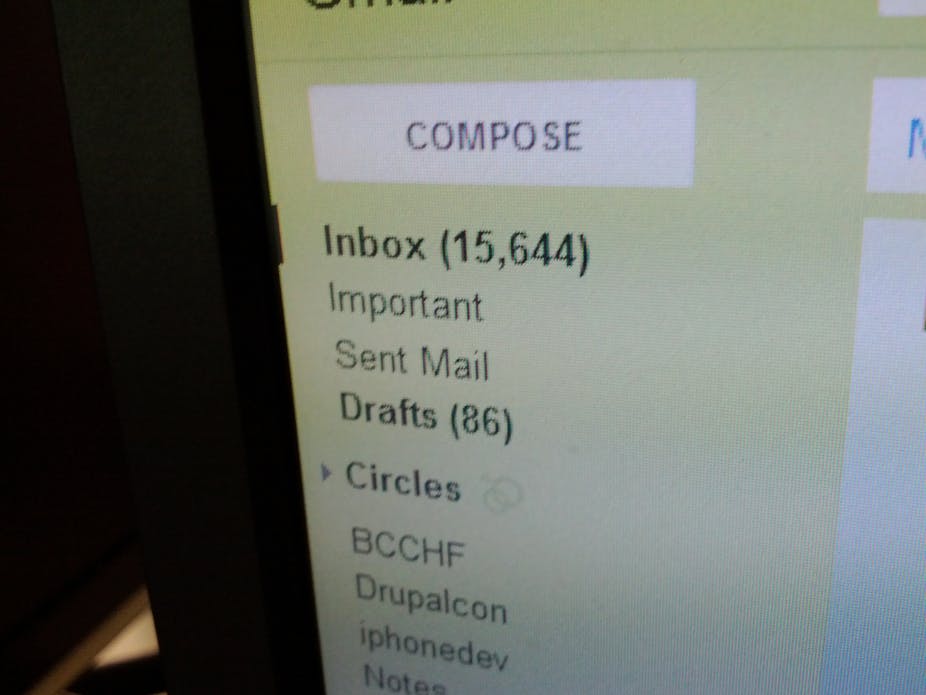A new computer program is seeking to help us cope with the deluge of email that floods our desktops on a minute-by-minute basis. It’s a sign of the times that we are adding on yet another service to cope with our own communications. We are truly in the age of too much information.
Taper is a paid-for service that is designed to act like a personal assistant, keeping email messages filtered and instinctively sending you messages in manageable doses in an attempt to eliminate overload. It will only allow you to see five unread messages at any time, holding others in a queue until you have dealt with the ones already on display.
Out of control email
It would be fair to assume that unless you’ve fallen into a communications-induced coma for the last ten years, you probably use email most days, if not during every working minute of every working day.
The Radicati Group estimates that around 3.3 billion email accounts exist worldwide, of which 25% are represented by corporate account holders. From these accounts, around 89 billion business emails are sent each day. As if that weren’t eye watering enough, the number is predicted to grow to around 144 billion by the end of 2016.
In real terms, that means the average worker can expect to spend a quarter of their working day on email-related tasks. The convenience and affordability of this mode of communication makes it an ideal channel for information transference. But at the same time, it is an equally good channel for information bombardment.
Past research has identified a phenomenon known as the TMI or “too much information” effect. In a world connected through the internet, communications such as email make it possible to work, or at least be accessible. Recent research has shown that employees are often glad to receive email for timely information, such as about an ongoing project, or a message thanking them for their work.
What they don’t like is to receive new email from people “chasing” information. They don’t like to be irrelevantly copied or cc’d in on missives and they don’t like emails that distract them from their work tasks.
Despite agreeing on the types of messages that are useful, employees interviewed in the research were divided on other matters. While some saw email’s ability to reduce the need for other forms of communication, such as phone calls and face-to-face meetings as a benefit, others believed the same feature was a destructive force that prevented them from fostering relationships with co-workers and developing a healthy workplace culture.
No going back
Either way, email isn’t going away. Few of us could get away with simply refusing to use it at work even if we do think it is stopping us from bonding with our colleagues. Whether you’re the proud owner of a well-maintained inbox or tearing your hair out with dread of the 100+ emails waiting for you, the aim of the game has become management rather than avoidance.
Thierry Breton, head of French IT services company Atos has advocated switching off email altogether for periods of time in the interests of wellbeing at work.
But while we might welcome a break from email, the reality is often that it ends up being little more than an institutionalised delay, simply pressing the pause button before the inevitable flow begins again. Indeed, research has shown that periods of email-free time resulted in short-term improvements to employee stress levels but that they displayed sharp increases in blood pressure and heart rate once they had opened their inboxes again, which was considered more detrimental to their health in the long term.
Given that we can’t put the email genie back in its bottle, it’s little wonder that a great deal of time, energy and money goes into developing systems for managing the information they contain. To the relief of many workers, software management programs like Taper are being designed in the hope of taking the human element out of the equation altogether.
However like many software programs before it, Taper still ultimately relies on the human that purchased it to play along. As the research shows, many of us feel we need to be “in the know” and will struggle to relinquish control of our information management.
How long will it take before you are opening emails without reading them just to trick Taper into giving you another one? How many emails go unread because they contain information that we don’t want to deal with rather than information that we don’t have time to deal with?
Even if you managed to stay on top of the workflow dictated to you by Taper, would you put all your faith and trust in a programme to know what information is important and which is not?
It is for these reasons that the number offices populated by email-overloaded workers will continue to grow. Perhaps we need to manage our own impulse to hit “send” a little more effectively before we starting hiring virtual PAs to stand guard over inboxes.

